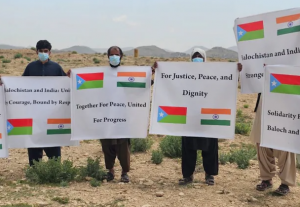Explained: Balochistan Independence Movement and India’s role

Have you ever wondered why Balochistan – Pakistan’s largest and most resource-rich province – is constantly in the news for insurgency, human rights violations, and recently, the Balochistan Independence Movement? Why are Baloch activists raising slogans in Geneva, London, and even New Delhi? And more importantly… what does India have to do with it?
Let’s break down the Balochistan crisis, the roots of the unrest, and India’s complicated role—past, present, and future.
Historical Roots of the Crisis
-
1947-48: The Accession Controversy
Balochistan makes up nearly 44% of Pakistan’s landmass, but only 5% of its population. Rich in gas, gold, copper, and uranium—yet one of the poorest, most underdeveloped regions in Pakistan. Balochistan Independence Movement began long ago—right after 1947. When Pakistan was created, the princely state of Kalat, which covers much of modern-day Balochistan, wanted independence. But in 1948, Pakistan annexed it, and the first Baloch rebellion began. This sparked the first Baloch revolt, with local leaders opposing the merger.
Since then, Balochistan has seen several insurgencies-in 1948, 1958-59, the 1970s, and ongoing since the early 2000s. Baloch nationalists accuse Pakistan’s army of treating the region as a colony—extracting resources without sharing profits, suppressing culture, and carrying out enforced disappearances. Thousands of Baloch activists, students, and intellectuals have gone missing. Many allege torture, extrajudicial killings, and mass graves.
The Current Crisis
2025 saw a major escalation: The Baloch Liberation Army – also known as BLA– hijacked the Jaffar Express train, resulting in over 400 hostages and at least 26 deaths. Protests erupted across Balochistan, met with harsh crackdowns by security forces. Meanwhile, May 9, 2025, as India-Pakistan skirmishes over Pahalgam tragedy was underway, Mir Yar Baloch publicly declared Balochistan’s independence from Pakistan, appealing to India, the United Nations, and the international community for recognition and support.
Insurgent groups like BLA, Balochistan Liberation Front, and Baloch Republican Army, have intensified attacks sharply from early 2025. They have executed more than 70 coordinated attacks under operations like ‘Herof 2.0’, targeting military posts, infrastructure, and key highways across Balochistan. These attacks have included bombings, temporary seizures of territory, and strikes on Chinese nationals and China-Pakistan Economic Corridor projects.
On the other hand, reports of enforced disappearances, extrajudicial killings, and political suppression are widespread. The government’s focus on security over development has only deepened local resentment.
Why Is Balochistan Important?
Despite being rich in gas, minerals, and a strategic coastline, Balochistan remains Pakistan’s poorest region. Locals accuse the central government of looting resources and neglecting development. The China-Pakistan Economic Corridor (CPEC), a 60-billion US dollar infrastructure project, runs through Balochistan with Gwadar Port in the state as its crown jewel. But locals say they were never consulted. While Chinese ships load resources, Baloch families remain in poverty. This has intensified resistance. Insurgent groups like the Baloch Liberation Army (BLA) have attacked Chinese engineers and Pakistani forces.
India’s Role: Fact vs. Allegation
Now comes the controversial part—India’s role.
Pakistan has long accused India of funding and training Baloch insurgents through Afghanistan. The 2016 arrest of Kulbhushan Jadhav, an alleged Indian spy, was presented as “proof.” India denied the charges but admitted he was a former naval officer. India officially denies any involvement in Balochistan’s internal affairs, calling Pakistan’s accusations baseless. It does, however, raise concerns about human rights abuses in Balochistan at international forums. In 2016, Prime Minister Modi mentioned Balochistan’s plight in his Independence Day speech, signaling diplomatic support for Baloch rights within international norms. Since then, Baloch activists have increasingly rallied for Indian support on international platforms. India views the Balochistan issue through the lens of regional security, especially due to CPEC and China’s growing presence. However, India treads carefully to avoid direct escalation with Pakistan.
The Balochistan crisis is rooted in history, fueled by economic and political grievances, and intensified by heavy-handed state responses. While India’s role has been the subject of much speculation, its current approach is largely diplomatic-raising human rights concerns and watching regional developments closely. India’s role is largely diplomatic and strategic—raising Baloch human rights at international bodies and giving space to their narrative globally. But, it is a tightrope walk. Any overt involvement risks pushing India into a proxy war and derailing its moral high ground on issues like Kashmir.
The Balochistan crisis is far from over. It’s a complex struggle of identity, autonomy, and geopolitics. India’s role—whether passive observer or active player—is constantly evolving.
But, one thing is clear: What happens in Balochistan will shape South Asia’s future.
By Sandeep Sarangi, OP
News